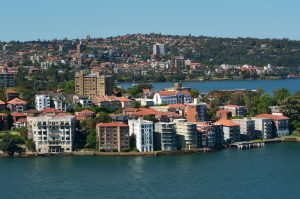Australia is a remarkably stable society. Although recently there has been a small amount of hostility toward public health measures due to the COVID-19 pandemic, and some support for radical political parties in May’s federal election, overall the public takes its domestic peace and civic cooperation seriously. Although its national myths attempt to portray Australians as “larrikins” – a kind of cross between a petty scofflaw and a children’s party clown – the country loves rules and hates making a fuss, even if there are conditions clearly to its detriment.
Social stability is reliant on human security – freedom from want and fear – and for the most part Australia can claim to provide not just strong human security for its residents, but excellent conditions for human flourishing. Yet there is one aspect of both human security and human flourishing that is increasingly becoming a serious problem for Australian society: the cost of housing.
According to a recent report by Demographia International that assessed the cost of housing by the ratio of median house prices to the median household income, Sydney has the second least affordable housing market in the world and Melbourne ranks fifth. Perth, Australia’s most affordable major city, is still ranked as the 19th least affordable city globally. Although the recent rise in interest rates is leading to a small fall in housing prices, the issue for the country remains stark.
The cost of housing in Australia means that individuals or couples can often pay up to half their income on either rent or mortgage repayments. This not only limits their ability to spend money on other essentials like food, education, and healthcare, but it also limits their ability to pursue interests or social activities, which are just as important for well-being. Unaffordable housing also prevents individuals from taking economic risks, contributing to Australia’s lack of economic complexity.
Housing, like food, is a necessity. Yet we do not have the same expectation that like food, housing should be plentiful, good quality, and affordable. In recent decades houses have ceased to become homes and instead become “assets.” No longer places to live, build families, entertain friends, and find sanctuary, instead property is now something we invest in, speculate on, and something whose prices we obsess over. The expectations we now have of property are not social; they are financial.
Both the market and governments have responded to this shift in thinking, the market through factoring in the desire for ever increasing property prices from homeowners, and governments through believing their role is to protect the monetary value of people’s property through land use regulations that restrict the supply of housing. Political parties make the democratic calculation that current homeowners are more numerous than renters or those looking to buy a home, and therefore the risk of alienating them is politically too great. Notably, the percentage of homeowners in Australia is declining.
Yet political parties in Australia didn’t always think in such narrow, self-interested terms. The founder of the Liberal Party and Australia’s longest serving prime minister, Robert Menzies, recognized that a home was far more than something of monetary value. He understood that there was a social and spiritual aspect to homeownership, and that to prevent young adults from owning a home was to inhibit their personal investment in the country’s social fabric, as well as their ability to pursue opportunity within it. He made home ownership a national policy goal because it was a socially stabilizing force during the Cold War.
We once again live in anxious times. The pace of economic and social change, combined with more turbulent domestic and international politics, has left many people feeling like they are without control over their own lives. This leads to people holding a genuine fear for their futures. The stress of high rents, mortgage payments, or inability to find housing in convenient locations only adds to this sense of unease. This is fertile ground for radical political movements that seek to exploit people’s insecurities and destabilize the country.
Australians may be by nature and culture a conservative people (in the philosophical sense), yet governments that rely on the generally subdued traits of the public to avoid tackling serious problems are failing in their duties as civic representatives. Australia owes both its current and emerging adults the conditions that will allow them to thrive, not simply survive. Homelessness is an unacceptable problem for a country of Australia’s wealth. Rethinking how the country views housing, and the policies that would prevent the current unaffordability from becoming a wider social problem, should be considered a national priority.

































